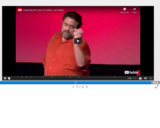
"Exploring the Mind of a Killer" Video
- Subject:
- Career and Technical Education
- Criminal Justice
- Material Type:
- Interactive
- Provider:
- Michigan Virtual
- Date Added:
- 03/15/2022

"Exploring the Mind of a Killer" Video

Slideshow about stereotypes
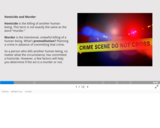
Homicide and Murder Slideshow
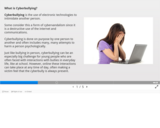
"What is Cyberbullying?" Slideshow

Supporting Victims Slideshow

Students learn the principles of the criminal justice field, the many criminal justice agencies, and federal, state and local laws.The course of study includes: historical perspective of American police agencies, with an emphasis on California law enforcement; philosophy of the origins of crime and the social impact on society; development of the criminal justice system, current trends and their relevance to local and state law enforcement; hiring and testing processes for positions in law enforcement; laws of arrest, search and seizure laws; court process; penal and vehicle codes - what constitutes a crime; child abuse and related offenses; drug and alcohol abuse and related offenses.
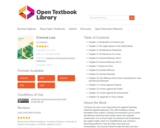
Criminal Law uses a two-step process to augment learning, called the applied approach. First, after building a strong foundation from scratch, Criminal Law introduces you to crimes and defenses that have been broken down into separate components. It is so much easier to memorize and comprehend the subject matter when it is simplified this way. However, becoming proficient in the law takes more than just memorization. You must be trained to take the laws you have studied and apply them to various fact patterns. Most students are expected to do this automatically, but application must be seen, experienced, and practiced before it comes naturally. Thus the second step of the applied approach is reviewing examples of the application of law to facts after dissecting and analyzing each legal concept. Some of the examples come from cases, and some are purely fictional. All the examples are memorable, even quirky, so they will stick in your mind and be available when you need them the most (like during an exam). After a few chapters, you will notice that you no longer obsess over an explanation that doesn’t completely make sense the first time you read it—you will just skip to the example. The examples clarify the principles for you, lightening the workload significantly.

These are a set of fictional case studies that are designed to prompt reflection and discussion about issues at the intersection of AI and Ethics. These case studies were developed out of an interdisciplinary workshop series at Princeton University that began in 2017-18. They are the product of a research collaboration between the University Center for Human Values (UCHV) and the Center for Information Technology Policy (CITP) at Princeton. Click the title of each case study to download the full document.
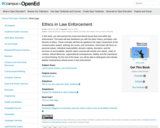
In this book, you will examine the moral and ethical issues that exist within law enforcement. This book will also familiarize you with the basic history, principles, and theories of ethics. These concepts will then be applied to the major components of the criminal justice system: policing, the courts, and corrections. Discussion will focus on personal values, individual responsibility, decision making, discretion, and the structure of accountability. Specific topics covered will include core values, codes of conduct, ethical dilemmas, organizational consequences, liability, and the importance of critical thinking. By the end of this book, you will be able to distinguish and critically debate contemporary ethical issues in law enforcement.

This introductory textbook is unique because it was a collaborative effort by all Criminology and Criminal Justice professors at Southern Oregon University (SOU) in Ashland, Oregon. This book can be used on a quarter or semester system, as well as cover topics that may get left out of some introductory texts such as controversial issues in the criminal justice system. Further, we made it as comprehensive as possible to cover core concepts and areas in the criminal justice system including theory, policing, courts, corrections, and the juvenile justice system. Additionally, we created examples that will help make difficult concepts or ideas more relatable. Every section provides an overview of key terms, critical thinking questions for course engagement, assignments, and other ancillaries such as multimedia links, images, activity ideas, and more.
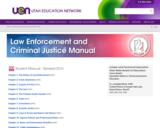
A student manual developed by the Utah State Board of Education, in cooperation with the Unified Police of Greater Salt Lake

Domestic Violence Incident Slideshow

it would be ideal if students already have learned that DNA is the genetic material, and that DNA is made up of As, Ts, Gs, and Cs. It also would help if students already know that each human has two versions of every piece of DNA in their genome, one from mom and one from dad. The lesson will take about one class period, with roughly 30 minutes of footage and 30 minutes of activities.